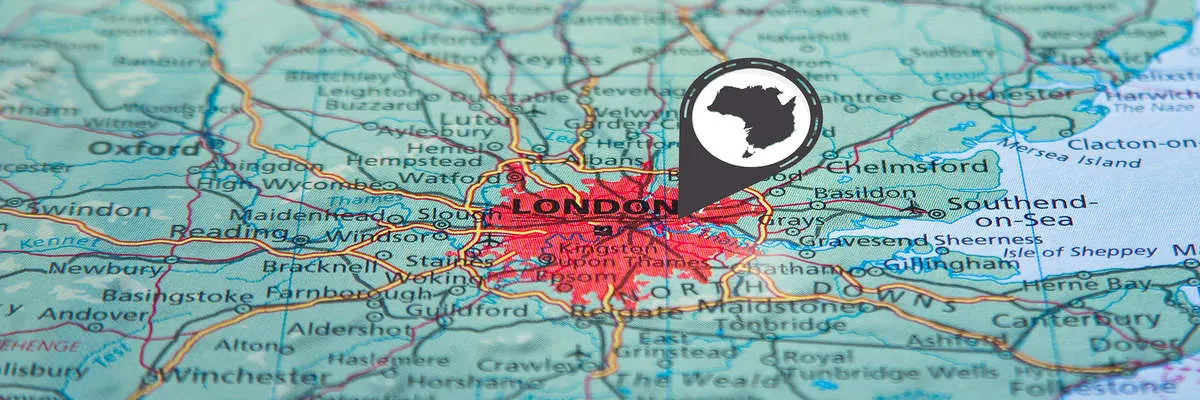If you’ve visited England, Ireland, Scotland or Wales – you know how absolutely stunning the UK is. A world all its own, this European nation is unique for more than just their currency and is a highly sought-after place to live. If you’re an American considering hopping the pond, this guide will be your complete how-to.
As an American, it can be quite difficult to move to the UK but the questions are subjective and will depend on a variety of factors. It might not be possible to move there easily because you wish to. Visas will be required and often a reason – for a career, schooling or living with a family.
Just because the process is difficult, doesn’t mean it’s impossible. This guide will be your comprehensive look at the preliminary steps to take, considerations to make if you’re on the fence about the move or just toying with the idea, as well as reasons why the UK may be your perfect home away from home.
Disclaimer: Hi! this post may contain affiliate links which will take you to online retailers that sell products and services. If you click on one and buy something, I may earn a commission, see my Affiliate Disclosure for more details.
Disclaimer: You should seek professional legal advice if you are unsure about how to move to the UK. Go to GOV UK to check if there have been any changes to the visa rules.
Ways of Getting into the UK

There are some factors which will make your situation easier if you’re looking to get into the UK. This is not an extensive list of visa opportunities and I highly recommend reading the gov.uk site for more details and fully understand your options.
Some of the following that may assist your process are:
- Being married to a UK Citizen. This is arguably the most natural way but doesn’t go marrying someone just for that. They have laws against it, and you’ll probably get caught and owe $250,000 or more. Haven’t you seen, ‘The Proposal’?
- You’re working in the UK. For this, you’ll be given a working visa, and this is much more permanent than any kind of tourist visa you can obtain. While most countries can enter the UK without a visa to travel, it’s an entirely different ball game to work in the UK. That will require a visa and sound reasoning for you being there.
If you’re caught trying to work in the country, you will be removed from the country and barred up to 10 years from re-entering. Then how will you get you English Bitter Ale or fish and chips?
- You’re related to someone in the country or have an ancestor. You will have an easier time with that country’s government if you have a link to the country. However with Brexit, if you move to the UK on a European passport there will be changes and you will need to add this into your plan.
- You’re Hirable. If you have a skill that is in demand and an employer who is willing to pay for your visa, you can apply for a Tier 2 General visa. Those who might apply for this could be professions like doctors, pharmacists, certain scientists, engineers, etc. Essentially, having a reason to be there is better than not. In 2021 this will be changing to a point-based.
- An American company wants to sponsor you. If they are willing to get you on an intra-company transfer, then the visa you’ll be looking for will be the Tier 2 Intra-Company Transfer Visa.
- You’re creative. You could get a Tier 5 Temporary Worker Visa. You can pick under Creative, Sporting, Etc.
- You wish to study in the UK. You can only do this visa if you plan to study full-time at university and pursue a degree in the UK.
These are just some of the factors that may aid your entrance to the UK. None of them are guaranteed and you’ll need to hire a professional to consult if you’re unsure about your eligibility or record.
Where to Find Information on UK Visa’s
The first step will be to know which visa you’ll need. You’ll want to visit the British Government’s official websites and check based on your specific case.
If you’re unsure you should check with an immigration consultant or advisor as they will be up to date on the latest requirements.
You’ll need to read all of the Tiers for the Visa structure and determine which one suits your needs. Some of the main ones are:
- Global Talent replaced the Tier 1 visa which allows people to move over as a recognised leader (exceptional talent), as an emerging leader (exceptional promise) or under the UK Research and Innovation (UKRI) endorsed funder option.
- Tier 2 Visa – If you’ve been offered a job in the UK., this is the visa you want to apply for. This is changing to point-based system in 2021.
- Tier 4 Student Visa – self-explanatory and only for short-term durations in the UK.
- Tier 5 – unfortunately American’s can’t get the Youth Mobility visa but there are other forms of Tier 5 like, Government Authorised Exchange, Creative and Sporting or Seasonal Worker Visa.
- Spouse Visa
How to Apply for UK Visa
Applications are started online and will require you to have your fingerprints and other biometric data recorded. As a part of your visa being processed, you will need to visit your nearest visa application centre (in your home country) to have your biometric data processed.
You can hire a visa service to assist you through the bulk of paperwork and be certain it’s all done correctly. If you love filling out forms that require immense attention to detail, have at it!
The general application process will be the following:
- fill in the application form and answer in English
- pay the health surcharge
- pay for the visa fee online (in most cases)
- print out your form
- book and attend an appointment at a visa application centre
- have your biometrics taken (fingerprints and photo) for a biometric residence permit.
Requirements you may need to meet as a part of the UK visa application:
- May need proof of your salary and that you can pay your bills, taxes, and living expenses
- May need to prove your fluency in English (the USA is normally exempt from this)
- May have to prove your funds and savings accounts, investment accounts, assets, etc
- Valid Passport with your travel in the last 5 years
- Not hold a criminal record
- TB test from an approved clinic (if applicable).
These are the basics, but factors will change depending on your situation so do your research and consult a professional on your specific case.
If you’re not a UK or EU citizen, then make sure you get your visa arranged before leaving your home country. While Americans, Canadians, Australians, New Zealanders and nationals from certain other countries can usually enter the UK visa-free as tourists, this does not give you the right to work.
When Should I Apply for the Visa?
Timing of your visa processing will be very important, and you’ll need to check with the British High Commission. They all have different processing times, but you don’t want to start more than a year ahead.
It will usually take 6 weeks so about 2-3 months ahead of your moving date is a good time to start. This is not a guarantee so do your research and understand that sponsorship is an entirely different beast that may take much longer.
You certainly don’t want to buy your air tickets or pick the apartment out before you’ve gotten this approved or else, you’ll be locked into a lease in a country you aren’t allowed to live in! Messy.
For official information on working visas and permit processing times please contact your nearest British Embassy or Consulate.
Moving Checklist
You’ve got what you need down to move and now you’re ready for the next steps. So what’s next?
Here are some factors you’ll need to keep in mind for your move overseas.
Research the Moving and Living Costs
Knowing roughly how much money you need for the move and living costs will set you up for success when you arrive. You will need money for visa, flights, travel insurance, shipping items and if applicable bringing your pet over.
To support your living costs you should try and prepare to have three months of accommodation, travel, food, five weeks’ worth of bond money and some money for fun activities. Unless you are luckily enough to have a company that is helping with your moving costs.
Some article to help you figure out how much you should bring and expected living costs:
- How Much Money Should I Save to Move to the UK? With a Cost Breakdown
- Cost of Living in London
- A Helpful Guide on How to Find a Flat in London
Have an Emergency Fund
With what we’ve have learnt in 2020, it’s super important to have an emergency fund in place for whatever circumstances occur.
Now, this is totally up to you how much you put away but consider putting enough for emergency flight home and months worth living costs as a minimum. Just remember that most UK visas will state no access to public funds so you will be the one that needs to cover the cost if anything goes wrong or insurance to cover the situation.
Organise and Prepare Your Stuff to Move Abroad
There is a lot to organise when moving overseas and your list will depend on whether it is temporary or permanent. To get you started I have prepared a detailed pre-departure article and checklist.
If you move is more permanent you will need to think more about shipping, storage or selling your belongings.
Whatever you decide to do your suitcase will be the most important item for the first few weeks in the UK and I have a detailed UK packing list based on what I learnt when I moved here.
Review Your Tax Requirements
Taxes can become complicated when you move to another country. As an American, you will need to file a tax return even when you are living aboard. Check with your accountant what you will need to do with your taxes in the US.
Sort Out Banking in the US and UK
Sorting out bank accounts in the UK can be frustrating! There are quite a few checks that happen with traditional banks but with the new challenger banks things have become easier to set up.
The first option is to set-up a Citibank Foreign Currency Account whilst in the US or alternatively with one with a non-traditional bank like Starling, Wise or Monzo.
I dive into more details on how to get a UK bank account before moving to the UK.
Postal
Go online and you can input your new mailing address. This is important for the Post office to know where to forward your mail to. Updating this in the system will avoid the wrong things being delivered to an empty or newly leased out home in the US.
Immunizations
Check with the embassy and request the full list of what is required of you Healthwise to enter the country and remain for an extended duration. You can get this done in one trip to your local clinic.
Travel Insurance
Travel insurance can come in handy wherever you’re travelling too and can help for trip cancellation, trip interruption, accidental death or dismemberment, medical and dental care, transportation to medical facilities, loss of luggage or personal possessions and protection against the bankruptcy. It doesn’t hurt to have this protection while you see if your move to the UK is temporary or permanent.
Flights
I can tell you from personal experience that you want to buy your flights either very early or very last minute. Everyone’s buying them 2-6 months out so this will be the time where they gouge the prices. You can buy about 9-12 months out for the best deal (avoiding holidays and reading the surrounding dates of when it’s cheapest to make your journey.
The other best time to purchase tickets is about a week or two before you depart. If you buy them the night before, they’ll be the cheapest. But there’s a whole other list of risks that come with that so don’t do this if you have deadlines waiting or you or a pet arriving before you, etc.
Taking Your Pet Overseas

We know you’re well researched because you’re here learning how to be the best pet owner possible. If you prep in advance, you’ll know how to move your family (including the fur-babies) overseas without a hitch.
There are many components which will affect your timing. Perfect timing and a solid game plan with your vet is really the key to all of this running without any hang-ups that could delay you or your pup.
Some tips if you’re thinking about or planning to move your fur-baby across the pond with you are:
- Check with your vet if your species of animal is allowed in the UK. Yes, some won’t be. Check the list to be safer rather than sorrier.
- Start looking for a home a couple to a few months early. You don’t want to be scrambling and it can take time to find the right place in a pet-friendly neighbourhood. We’ll discuss these in the next section.
- Rabbies must be valid so keep all vaccination forms and certificates in one place.
- If you’re presently living in an EU country, you’ll need to check if you need a pet passport. As adorable as these sound, they do take time to get so start early on this.
- If you’re not from an EU country, then you’ll need a Third Country Approved Veterinary Certificate. You can find the links for different forms you may need to enter the UK here.
- Get your pet microchipped before you leave. This works for any breed (feline, pup, ferret). This is sometimes a requirement of different countries anyways but this way if they run off, you can track them at any local vet. They all have the software to search for these chips.
- Check with your vet for any vaccinations needed to the country and you’ll need about a month afterward before you can actually move them. For UK it is 21 days after vaccination before you can enter the country.
- You cannot bring more than five pets unless it’s for a training or competition show. You can find the list of further requirements and information here – UK government and EU institutions.
- You will have a form to fill out which is available in an open document, PDF, or Word format. This is to be filled out through the link above that says UK government and EU Institutions). The form will be called – Health certificate for pets entering the EU from non-EU countries and some territories.
- Your pet must enter the EU country up to 10 days from the date in which this certificate is issued and signed by your veterinarian. This certificate can be used for travel between EU countries, which includes the UK for up to four months from it’s issuing date.
Things You May Love About the UK

This is a country that is easy to love. There are tons of culture, Shakespeare, Guinness, the Scotts, and more! Things that may capture your heart if you’re unsure about the move are:
- The accents – if you love language and speaking the way we used to with care and intention, you will love the Brits and their absolutely marvellous way with words. Big fan, obviously.
- Healthcare – it’s taken care of because you pay higher taxes, but wouldn’t you pay more to live in a place with beautiful streets and the governments taking care of its people?
- Education – if you don’t know how much better education is overseas, google it. You’ll be amazed at how it’s even possible for the US to charge so much and take young people for their billion-dollar industry of student loans.
- You like cold and rainy weather. This is a very personal one and will be up to where you thrive best and what environment you can handle for the long-term.
- Great public transportation – you can probably sell your car and save thousands every year in expenses. The subway is fun, the buses are cheap, trains are a peaceful time to sit back and watch the countryside, and walking is a way of life here. Your legs will look amazing, your tush will be firm and your wallet will thank you.
- Great pubs and nightlife. With a whole new appreciation for alcohol, there are fun times on every corner whether you want a bustling club or a quiet hole in the wall.
If any of these made your heart sing along with rolling hills and beautiful countryside, the UK might be the place for you.
If You’re Unsure About Moving

On the fence about your move? Here are some reasons that may help you in deciding. This isn’t to build up a hate list against England, because I absolutely adore England.
These are only factors to consider before you dive into a long and difficult process like moving your life overseas. You may not be cut out for it and that is more than fine.
Things to consider are
- Weather – it is freezing here and as someone that loves the heat, it’s still hard for me to adjust to this.
- The culture – It’s different. If you love America and BBQ and Tex-Mex, you may not be interested in Shakespeare and libraries. It may be quieter but that may be the perk to some.
- It’s expensive – far more expensive than in America. The average rent that you will pay in the UK varies depending on where you live. A one-bedroom flat averages at £850 (a bit more than $1000 USD) per month, but if you’re in the city you may be paying $2-3K for a one-bedroom flat. Along with expensive parking costs, higher food prices, etc. It can be a lot to adjust to.
- They actually consume more alcohol than us. This is proven and they are known to start at a younger age in European countries. If this offends you or you don’t approve of tomfoolery, then you’re no fun. But you probably shouldn’t move to a loud spot in the city. You can consider a quieter rural spot, but the same traditions apply throughout the country.
- There’s rarely sunshine – this wipes out your vitamin D and can truly be depressing. If you need sunshine and hate Seattle, don’t move to the UK.
Final Thoughts
Anytime someone is asking, ‘How difficult is –“it’s difficult to answer because the question is subjective. It’s based on personal opinion and what is difficult for me may not be difficult for you.
I think the best advice anyone can have when embarking on a new adventure as big as moving continents; you need to be well researched and hire professionals that do this every day.
Don’t be cheap when it comes to your move because if the process is done incorrectly, you miss a line in your paperwork, or something is done incorrectly – it’ll be your butt being deported back to the US.
It could also result in your being banned from the country for 10 years. So do it right. Like a good tattoo, it’ll be pretty permanent, so you want it done by a professional.
Read reviews, and you’ll see some people have a very simple time getting into the country. Many academics with PhDs found the process very easy.
Good luck with your move and send me a postcard! Bon Voyage!
More Resources for Moving to the UK
How to Move Your Pet From the US to the UK: A Step-by-Step Guide
Moving to the UK from Australia Checklist (Epic Guide!)
UK Packing List: What to Pack When Moving to the UK

Kat
Hi, I'm Kat, an Australian that moved to London in 2013 to start a new adventure. What a roller-coaster that was! I love helping others move to the UK and people explore the world! I’d be honoured if you’d say, “Thanks!” with a £3 coffee on Ko-fi.




